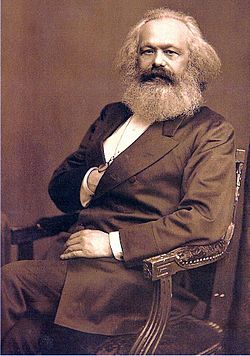May 5: Karl Marx
Karl Marx (1818)
It was on this date, May 5, 1818, that the theorist of modern Socialism, Karl Heinrich Marx, the son of a German rabbi, was born in Trier, on the river Moselle, in what was then called Prussia. His father converted to Protestantism as a business move, which may have sent the message to Marx that religion is a political rather than an ethical belief. Nevertheless, the young man received a first class education in philosophy at Berlin University. Marx fell under the spell of the Atheist Bruno Bauer, and was attracted to the writings of Ludwig Feuerbach and other radical Hegelians, so his own Atheism was an early component of his politics.
But his politics continually got him into trouble with the police, so Marx was compelled to flee from country to country. The year after the University of Jena conferred on him the degree of Doctor of Philosophy, Marx met Friedrich Engels while working as a journalist for the Rheinische Zeitung in Cologne. They finally settled in London, with Engels supporting Marx, while the two of them collaborated on the Communist Manifesto (Manifest der kommunistischen Partei)—published in time to be read in the aftermath of the French Revolution (1848).
As for religion, Marx's ideas were more nuanced than the popular brief quotation, "Religion ... is the opium of the people." The full quote from Contribution to the Critique of Hegel's "Philosophy of Right" reads,
Das religiöse Elend ist in einem der Ausdruck des wirklichen Elendes und in einem die Protestation gegen, das wirkliche Elend. Die Religion ist der Seufzer der bedrängten Kreatur, das Gemüt einer herzlosen Welt, wie sie der Geist geistloser Zustände ist. Sie ist das Opium des Volks.
Die Aufhebung der Religion als des illusorischen Glücks des Volkes ist die Forderung seines wirklichen Glücks: Die Forderung, die Illusionen über seinen Zustand aufzugeben, ist die Forderung, einen Zustand aufzugeben, der der Illusionen bedarf. Die Kritik der Religion ist also im Keim die Kritik des Jammertales, dessen Heiligenschein die Religion ist.
Religious suffering is, at one and the same time, the expression of real suffering and a protest against real suffering. Religion is the sigh of the oppressed creature, the heart of a heartless world, and the soul of soulless conditions. It is the opium of the people.
The abolition of religion as the illusory happiness of the people is the demand for their real happiness. To call on them to give up their illusions about their condition is to call on them to give up a condition that requires illusions. The criticism of religion is, therefore, in embryo, the criticism of that vale of tears of which religion is the halo.*
In other words, as Marx says elsewhere in the same work, "The abolition of religion as the illusory happiness of the people is the demand of their actual happiness" ("Die Aufhebung der Religion als des illusorischen Glücks des Volkes ist die Forderung seines wirklichen Glücks.").
Up until the day he died, on 14 March 1883 at age 64 in London, Marx wasted few words on religion, as he was founding a political philosophy, not a religious one, and Atheism was only incidental to it. With the triumph of capitalism and free enterprise over communism, most civilized nations today provide some relief to workers from the capitalist excesses about which Marx warned the world 150 years ago.
* Contribution to the Critique of Hegel's "Philosophy of Right" by Karl Marx, published in Deutsch-Französische Jahrbücher, February, 1844.
Originally published May 2003 by Ronald Bruce Meyer.


